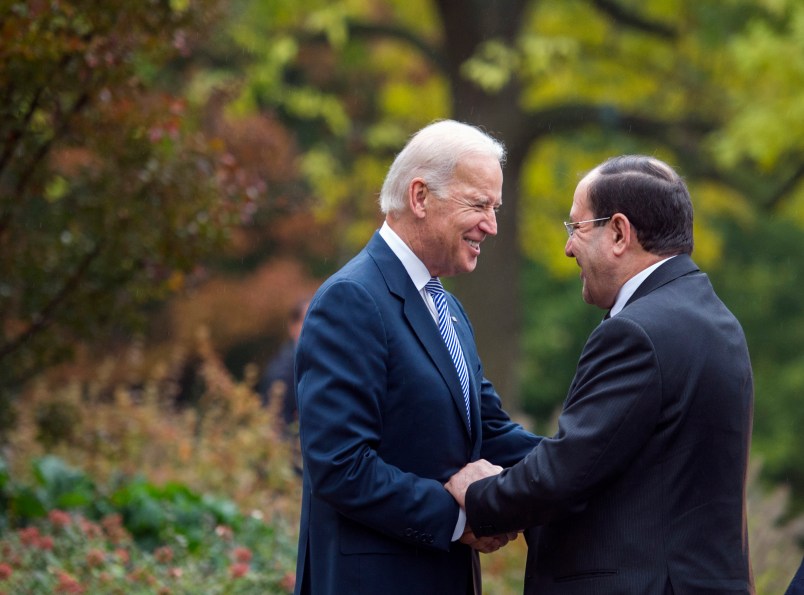WASHINGTON (AP) — Vice President Joe Biden is reassuring Iraq’s government of U.S. support in the fight against the Islamic State group, telephoning Prime Minister Haider al-Abadi with thanks for “the enormous sacrifice and bravery of Iraqi forces” one day after Defense Secretary Ash Carter questioned the Iraqi military commitment.
Biden’s call on Monday followed harsh criticism from Iraqi and Iranian quarters after Carter questioned Iraqi forces’ “will to fight” the surging Islamic State group.
A White House statement on Monday describing Biden’s call said the vice president welcomed an Iraqi decision to mobilize additional troops and “prepare for counterattack operations.” Biden also pledged full U.S. support to “these and other Iraqi efforts to liberate territory from ISIL,” the statement said, using an acronym for Islamic State.
In reaction to Carter’s remarks, which were aired Sunday in a TV interview, a spokesman for Iraq’s prime minister suggested the defense secretary had “incorrect information,” while Gen. Qassim Soleimani, the head of the elite Quds forces in Iran’s Revolutionary Guard, offered his own critical assessment of U.S. forces.
The heated exchanges came after the loss of Ramadi and amid other gains by the IS in recent days. The statements laid bare fissures among countries that have become allies of convenience against the militants. The criticism from both Iraq and Iran began when Carter told CNN’s “State of the Union” that Iraqi forces “vastly outnumbered” the Islamic State group, but still “showed no will to fight” and fled the IS advance on the capital of Anbar province.
On Monday, Saad al-Hadithi, a spokesman for al-Abadi, said his government was surprised by Carter’s comments.
“We should not judge the whole army based on one incident,” al-Hadithi told The Associated Press.
Al-Hadithi said the Iraqi government believes the fall of Ramadi was due to mismanagement and poor planning by some senior military commanders in charge. However, he did not elaborate, and no action has been taken against those commanders.
In Iran, the daily newspaper Javan, which is seen as close to the Revolutionary Guard, quoted Soleimani as saying the U.S. didn’t do a “damn thing” to stop the extremists’ advance on Ramadi.
“Does it mean anything else than being an accomplice in the plot?” he reportedly asked, later saying the U.S. showed “no will” in fighting the Islamic State group.
Soleimani said Iran and its allies are the only forces that can deal with the threat. “Today, there is nobody in confrontation with (the Islamic State group) except the Islamic Republic of Iran, as well as nations who are next to Iran or supported by Iran,” he said.
So far, the American approach to the conflict has been to launch airstrikes as part of an international coalition it leads, as well as equipping and training Iraqi forces. But U.S. officials also have become uneasy with Iran’s growing role in the conflict.
While Iraqi officials criticized Carter’s comments, his assessment was comparable to one that Gen. Martin Dempsey, chairman of the Joints Chief of Staff, made last week: “The ISF was not driven out of Ramadi. They drove out of Ramadi.”
Still, a senior Obama administration official, speaking before Biden’s call was announced, tried to soften Carter’s blunt words: “We know the Iraqi retreat followed an intense wave of suicide bombings. The reference to lack of will was in relation to this specific episode, which followed 18 months of fierce ISF attrition against ISIL in Ramadi, coupled with what the Iraqi government has acknowledged were breakdowns in military command, planning, and reinforcement.”
The official was not authorized to discussed the matter publicly and spoke on condition of anonymity.
Iran has offered advisers, including Soleimani, to direct Shiite militias fighting against the extremists. Iran has said it does not have combat troops fighting in Iraq, though some Revolutionary Guard members have been killed there.
Baghdad has said military preparations are underway to launch a large-scale counteroffensive in Anbar province, involving Iranian-backed Shiite militias. However, that possibility has sparked fears of potential sectarian violence in the Sunni province, long the scene of protests and criticism against the Shiite-led government in Baghdad.
Beyond that, Mideast officials gathered this past weekend in Jordan at an economic summit said they wanted more involvement from the U.S. in the Islamic State war, including weapons deliveries and military action beyond its coalition airstrikes. Obama has remained leery of involving America in yet another ground war in Iraq after only withdrawing combat troops at the end of 2011.
___
Associated Press writers Nasser Karimi in Tehran and Bassem Mroue and Sarah el-Deeb in Beirut contributed to this report.
Copyright 2015 The Associated Press. All rights reserved. This material may not be published, broadcast, rewritten or redistributed.







Rather than backing down, this should be a turning point for this Adminstration’s policy in Iraq. No more money, equipment, or American lives for a country that was never meant to be a country. Iraq was carved out by the British, and held together by brutal despots. We need to let it go.